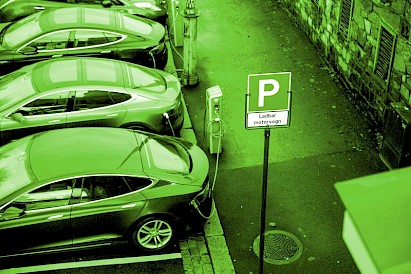Electric cars should face ‘tyre tax’, says air quality adviser
 A ‘tyre tax’ will need to be imposed on electric cars to combat poor air quality in cities, the Government’s top clear air adviser has claimed.
A ‘tyre tax’ will need to be imposed on electric cars to combat poor air quality in cities, the Government’s top clear air adviser has claimed.
The chairman of the Government’s independent science advisory group on air pollution said charges for low-emission zones are likely to be replaced with alternative levies as drivers switch to electric vehicles.
Particles from tyre wear are more dangerous to public health than diesel exhaust fumes, Professor Alastair Lewis said.
Known as “particulate matter (PM) 2.5”, the amount of air pollution is growing because motorists are driving ever larger vehicles with more substantial tyres.
Professor Lewis said: “If you compare a modern Mini now with an old Mini, they’re almost unrecognisable in their size.
“[And] larger, heavier vehicles will generate more particles.”
“PM 2.5 is considered to cause the largest amount of damage to public health… Nitrogen dioxide [from diesel fumes] comes second.”
Sadiq Khan, the London mayor, announced a “war on pollution” earlier this month with plans to expand a Ultra-Low Emissions Zone (Ulez) to cover nearly all of Greater London.
If his proposals go ahead, any motorists whose vehicle does not meet strict environmental criteria will have to pay £12.50 a day to drive in nearly every borough inside the M25.
An expansion of the Ulez by Mr Khan last October to 33 boroughs inside north and south circular roads has forced nurses and doctors to park their cars outside the charging zone and walk the last part of their journey to hospitals to avoid paying the levy.
Boris Johnson has brandished Mr Khan’s latest proposals “another tax on families and businesses and white vans and the rest of it, is going to hit people just when we’re trying to put more money into their pocket”.
Professor Lewis, also chairman of the Department for Transport Science Advisory Council, said: “When everybody owns a low emissions vehicle, low emission zones become a toothless control lever to try to manage air pollution.
“A world where we [have] jam-packed roads full of electric cars [also] isn’t a particularly attractive one… Even if they are electric, [they] will generate lots of particles.”
“At some point in the future when most of those cars have disappeared, a different form of air pollution control” is likely to be needed, he added.
“We do have to project forward about how we’re going to manage vehicles in large cities like London in the future when we have a largely electrified fleet of vehicles.”
Luke Bosdet, an AA spokesman, said he was opposed to the idea of any tax on an electric vehicle which would act as a deterrent to them replacing traditional petrol or diesel vehicles.
“Electric vehicles don’t produce emissions from their tail pipes,” he said. “They are a massive leap forward. The technology will evolve to reduce anything that comes from the tyres. You should not deter people from buying electric cars.”
Mr Khan’s plans to expand the Ulez zone to the outskirts of the capital is due to go ahead in 2023. His campaign to tackle harmful emissions follows the tragic death of nine-year-old Ella Adoo-Kissi-Debrah, who became the first person in the UK to have air pollution listed as the cause of death.
Gareth Bacon, Conservative MP for Orpington, has launched a petition to block the London mayor’s proposals.
He said: “If you are in outer London, and you have a vehicle that fails the Ulez standard, this is going to cost you and if you use that vehicle every day is going to cost you an extra £4,500-a-year.”
A spokesman for the Mayor of London said: “Toxic air caused by traffic is still leading to children growing up with stunted lungs and nearly 4,000 premature deaths a year – with the greatest number of deaths attributable to air pollution in London’s outer boroughs, which the Ulez doesn’t currently cover. There has also been a slower rate of improvement in air quality in outer London than in central and inner London.
“When weighing up the different options, the rising cost of living was a key consideration. With Londoners budgets under pressure, the Mayor would not ask Londoners to pay more unless he was convinced it is justified to reduce pollution, save lives and protect health.”
You can return to the main Market News page, or press the Back button on your browser.

